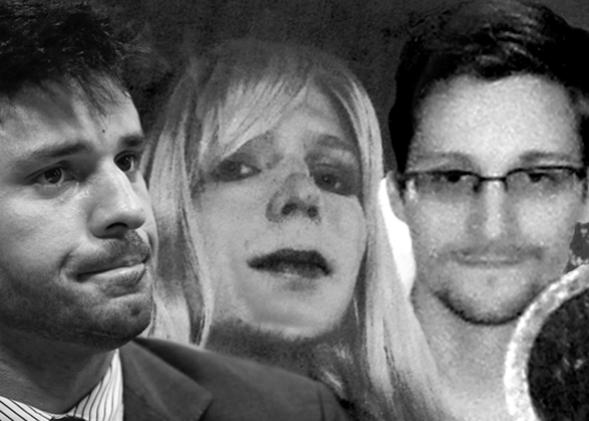Nine days after the attacks of Sept. 11, 2001, President Bush issued a warning to the world: “Either you are with us, or you are with the terrorists.” In speech after speech, he repeated, “Either you’re with us … or you’re with the enemy. There’s no in-between.”*
Twelve years, two wars, and one president later, we’re still enforcing that policy. In fact, we have escalated it. Anyone who leaks classified documents that expose government surveillance is accused not just of violating secrecy laws, but of serving the enemy.
Two years ago, the U.S. Army announced that it would charge Chelsea (then Bradley) Manning with “aiding the enemy,” a crime punishable by death. Manning had given hundreds of thousands of secret U.S. documents to WikiLeaks, not to al-Qaida. Nevertheless, according to the prosecution, this amounted to aiding the enemy, since “WikiLeaks was merely the platform which Pfc. Manning used to ensure all the information was available for the world, including the enemies of the United States.”
Three months ago, Manning was acquitted of that charge but convicted on others. The government turned its attention to a new team of alleged traitors: former National Security Agency contractor Edward Snowden and journalist Glenn Greenwald. On Aug. 18, the United Kingdom detained Greenwald’s domestic partner, David Miranda, for nine hours at Heathrow Airport. British officers threatened Miranda, interrogated him, and confiscated his computer and storage devices. To justify this treatment, they cited “Schedule 7 of the Terrorism Act 2000.” The U.K. Home Office said police were entitled to use this power against “highly sensitive stolen information that would help terrorism.”
Last week, the document that triggered Miranda’s detention—a notice to port authorities prepared by British police and counterintelligence officials—was revealed in court. According to Reuters and the Guardian, the notice declared:
We assess that Miranda is knowingly carrying material, the release of which would endanger people’s lives. Additionally the disclosure or threat of disclosure is designed to influence a government, and is made for the purpose of promoting a political or ideological cause. This therefore falls within the definition of terrorism …
On Friday, Newsweek added a new offense to the list of implicit allegations against Snowden: protecting Chinese espionage. According to the magazine’s cover story, Snowden, armed with his cache of NSA files, initially
reached out to reporters after the public revelations about China’s surveillance of the [New York] Times’s computers and the years of hacking by [the Chinese military] into networks used by American businesses and government agencies. On May 24, in an email from Hong Kong, Snowden informed a Washington Post reporter to whom he had given documents that the paper had 72 hours to publish them or he would take them elsewhere; had the Post complied, its story about American computer spying would have run on the day [U.S. National Security Advisor Tom] Donilon landed in Beijing to push for Chinese hacking to be on the agenda for the presidential summit.
Instead, says Newsweek, “The first report based on Snowden’s documents finally appeared in the Guardian on June 5, two days before” a meeting between President Obama and Chinese President Xi Jinping. “When Obama raised the topic of hacking, administration officials say, Xi again denied that China engaged in such actions, then cited The Guardian report as proof that America should not be lecturing Beijing about abusive surveillance. ‘Snowden couldn’t have played better into China’s strategy for protecting its cyber activities if he had been doing it on purpose,’ one American intelligence official says.”
Worse yet, the magazine notes,
After fleeing to Hong Kong, [Snowden] provided local reporters with NSA documents and told them the United States was hacking major Chinese telecommunications companies, a Beijing university and the corporate owner of the region’s most extensive fiber-optic submarine cable network. That information, government officials and industry experts say, is now used by the Chinese to deflect criticisms of their hacking, both in meetings with the administration and at cyber security conferences.
And as if that weren’t enough, “subsequent Snowden disclosures about American surveillance of allied countries and world leaders (including German Chancellor Angela Merkel) have robbed the United States of the ability to persuade other countries to join it in condemning China.”
Manning, Miranda, and Snowden are different in many ways. But two things unite them. First, they have all participated in the transfer or release of secret government documents. Second, for doing this, they have been accused, through formal charges or insinuation, of collaboration with enemies of the state. In Manning’s case, the indictment hinged on the sheer fact that the global public “included” our enemies. In Miranda’s case, the British government argued that disclosure of surveillance programs would help terrorists evade them and thereby “endanger people’s lives.” In Snowden’s case, the suggestion is that because his leaks exposed U.S. hypocrisy about espionage, they served China’s nefarious interests deliberately or—wink, wink—in a remarkable coincidence.
In none of these cases has the government presented any evidence that the leaker intended to aid, or had any contact with, our adversaries. The rationale is simply that our adversaries benefit from disclosures of classified information. That argument is true, but it’s far too broad. It defines all leaking not simply as a crime, but as treason. It insults the meanings of espionage and terrorism. It endangers us all.
Correction, Nov. 5, 2013: This article originally misstated the date for the Sept. 11 terrorist attacks. They were in 2001, not 2011. (Return.)
